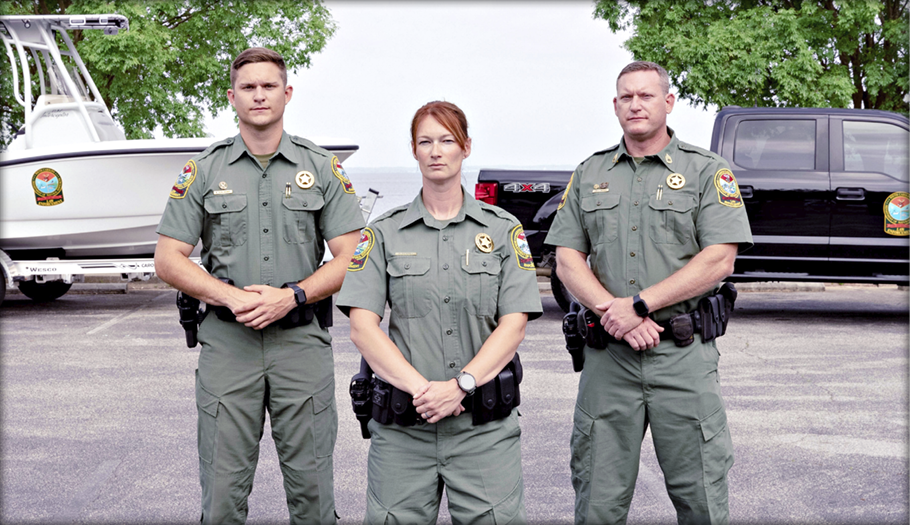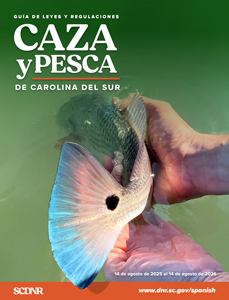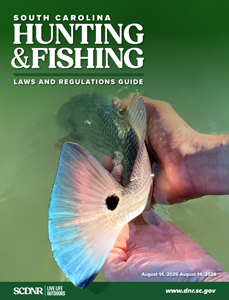Point & Suspension Systems

Point & Suspension Systems for Natural Resource Violations
South Carolina law has established suspension systems based upon the accumulation of points assessed for convictions of natural resource laws.
The Game and Fish Point System applies to violations inland of the saltwater/freshwater dividing line and if suspended under this system, a person cannot hunt, freshwater fish, gather, trap, land, or pursue game, or freshwater fish, in the state.
The Saltwater Point System applies to violations within the coastal waters of the State, seaward of the saltwater/freshwater dividing line. The point categories for assessments are recreational and commercial. Points are assessed according to the appropriate category. Upon accumulation of 18 or more points in the recreational or commercial categories, a person’s privileges to fish, gather, land, attempt to take, or possess fish, shellfish, or crustaceans within the coastal waters for the purposes of the affected category will be suspended. Suspensions under the Saltwater Point System do not effect inland freshwater fishing privileges except for shad, herring, and sturgeon which are regulated by coastal laws inland of the saltwater/freshwater dividing line.
Each time a person is convicted of a violation listed in the point systems, the Department must assess the points against the person’ s record. Half of the points on record are reduced for each full year in which the person receives no points. The Department of Natural Resources must suspend the privileges of any person who has accumulated eighteen (18) or more points.
In addition to these point suspensions, South Carolina law also contains mandatory suspensions for convictions of specific violations of the law. These suspensions are called “Statutory Suspensions.” See Table C for some specific examples of statutory suspensions.
Point System Suspension Appeals
A person who has been notified of a suspension may appeal the suspension pursuant to the South Carolina Administrative Procedures Act. The appeal of the suspension is not an appeal of the person’s conviction. The Administrative Law Court does not have jurisdiction to review the conviction, only the suspension. Appeals must be filed and served within 30 days of the date of suspension notice. You must file the appeal with the Clerk of Court of the Administrative Law Court. South Carolina Administrative Law Court, Edgar A. Brown Building, 1205 Pendleton St., Suite 224, Columbia, SC 29201, Voice: 803- 734-0550, Fax: 803- 734-6400.
If an individual appeals a suspension SCDNR will temporarily end the suspension. The result is that an individual will retain the privileges that were initially suspended during the period of appeal. The period of appeal begins when SCDNR receives notification from the Administrative Law Court that the case has been scheduled for a hearing. SCDNR will notify the individual in writing when the period of appeal begins. Until that notice is received the suspension remains in effect. A withdraw of the appeal by the individual, or a finding in favor of SCDNR by the Administrative Law Court will result in the individual having to serve the remainder of the suspension. A finding in favor of the individual, or a finding by SCDNR that the suspension was in error, will result in a dismissal of the suspension.
Note:
- A violation of natural resources law while under suspension may result in additional suspensions of one year to five years.
- The purchase or procurement of a license, permit, stamp, or tag allowing suspended privileges while under suspension is a fraudulent purchase and is a misdemeanor punishable by a fine of up to $1,085.00 and an additional one year suspension of hunting and fishing privileges.
- Failure to pay fines and/or restitutions may result in suspension of privileges.
To find out more information on suspensions, contact the S.C. Department of Natural Resources, Records and Intelligence Section, Law Enforcement Division, P.O. Box 167, Columbia, SC 29202 or call 803-734-3876.
|
Table A – Game and Fish Points |
|
|
Violation |
Pt. |
|
Hunting migratory birds with an unplugged gun |
4 |
|
Unlawful possession of buckshot |
5 |
|
Hunting or fishing without a proper license, permit, stamp, or tag |
6 |
|
Failing to report the harvest of a big game species |
6 |
|
Taking more than the legal limit of game or fish (except striped bass) |
8 |
|
Violating Wildlife Management Area regulations |
8 |
|
Unlawful hunting over bait |
8 |
|
Unlawful night hunting other game, except deer or bear, or hunting during prohibited or after hours |
8 |
|
Taking game or fish in any illegal manner not specifically mentioned elsewhere in the point systems NOTE: Some examples are: a. Taking waterfowl with lead shot. b. Taking fish with too many devices. c. Killing birds of prey (Hawks, Kites, Vultures, Kestrels, Owls, or Falcons). d. Killing/possession of nongame birds. e. Taking fish while violating specific freshwater nongame fishing laws such as illegal bait on trotlines or set hooks. f. Taking game while violating specific trapping laws such as unlawful traps. Other less common examples are, but are not limited to, taking game while unlawfully hunting with an electronic call, or killing a turkey with a rifle. The application of this is very broad and examples are given for clarification. This applies to unlawfully taking game or fish in a way that is not specifically addressed by the Game and Fish Point System. |
8 |
|
Hunting, fishing, or trapping out of season |
10 |
|
Using a borrowed or altered hunting or fishing license, permit, stamp, or tag |
10 |
|
Unlawful transportation of furs or hides and possession of untagged hides |
10 |
|
Trapping quail or turkeys |
10 |
|
Hunting turkey over bait (no game taken) |
10 |
|
Hunting waterfowl over bait |
10 |
|
Shooting waterfowl over bait (game taken) |
10 |
|
Trapping, netting, or seining game fish unlawfully |
10 |
|
Attempting escape after arrest |
14 |
|
Hunting or fishing in a state sanctuary |
14 |
|
Unlawful selling of game or game fish |
14 |
|
Trespassing to hunt, fish, or trap |
14 |
|
Unlawful hunting, taking, possessing, or selling alligators |
14 |
|
Killing or attempting to kill or molest deer from a motorboat |
14 |
|
Unlawful killing or possession of antlerless deer |
14 |
|
Killing or possession of a hen turkey during the spring gobbler season |
14 |
|
Unlawful possession, taking, or attempting to take raccoons during the season for hunting without firearms |
14 |
|
Taking or possessing an undersized striped bass |
14 |
|
Taking or possessing more than the legal limit of striped bass |
14 |
|
Taking or possessing more than the legal creel or size limit of blue catfish |
14 |
|
Hunting waterfowl out of season |
15 |
|
Taking or possession of more than one waterfowl over the legal limit |
15 |
|
Intentional trespassing to hunt, fish, or trap |
18 |
|
Night hunting deer or bear |
18 |
|
Killing or possession of wild turkey during the closed season |
18 |
|
Roost shooting turkey between one-half hour after sunset to one-half hour before sunrise |
18 |
|
Shooting turkey over bait (game taken) |
18 |
|
Trespassing to hunt waterfowl |
18 |
|
Resisting arrest by force, violence, or weapons against the person of any law enforcement officer enforcing natural resource laws |
18 |
|
Table B – Saltwater Points |
|
|
Saltwater points are assessed in two categories: Recreational and Commercial. Upon an accumulation of eighteen (18) or more points in a category, the privileges of that category will be suspended for one year. While under Recreational Suspension, a person found guilty of a commercial saltwater violation will have all saltwater privileges suspended for one year. While under Commercial Suspension, a person found guilty of a recreational violation will have all saltwater privileges suspended for one year. |
|
|
Violation |
Pt. |
|
Failing to keep records or make reports as required by law, permit or regulation |
4 |
|
Violations of law pertaining to crab size limit or sponge crabs |
4 |
|
Violations of a section of Title 50 pertaining to saltwater fisheries not mentioned specifically in this section (NOTE: This point assessment applies to all other convictions that are not specifically mentioned herein. Any conviction for a violation of a saltwater fisheries law will be assessed a minimum of 6 points). |
6 |
|
Taking, attempting to take, or possessing fish, shellfish or crustaceans in an unlawful manner, in unlawful or closed areas, during unlawful hours, or during the closed season except trawling violations |
8 |
|
Selling or offering for sale fish, shellfish, crustaceans, or other seafood or marine products without a proper license, permit, stamp, or tag |
8 |
|
Unlawfully buying fish, shellfish, crustaceans or other seafood or marine products without a proper license, permit, stamp or tag |
8 |
|
Trawling inside the General Trawling Zone other than in restricted areas: |
|
|
(a) more than one quarter nautical mile during the closed season |
10 |
|
(b) more than one quarter nautical mile at a time more than ten minutes before daily opening or ten minutes after daily closing times during the open season |
10 |
|
Trawling in a restricted area during the closed season |
10 |
|
Taking or attempting to take fish, shellfish or crustaceans for a commercial purpose without a proper license, permit, stamp or tag |
10 |
|
Violating Department of Health and Environmental Control regulations promulgated pursuant to Section 44-1-140 related to the harvesting and handling of shellfish resulting in adulterated product as defined in Regulation 61-47 |
10 |
|
Trawling outside the General Trawling Zone: |
|
|
(a) one hundred yards or less distance from the nearest point of the General Trawling Zone during the open season |
10 |
|
(b) more than one hundred yards distance from the nearest point of the General Trawling Zone during the open season |
18 |
|
(c) during the closed season |
18 |
|
Captain or crew of a boat failing to cooperate with an enforcement officer |
18 |
|
Channel netting in an area closed to channel netting or during closed season for channel netting |
18 |
|
Applying for or obtaining any resident license as provided in this chapter using a falsified application or supporting documentation, or simultaneously possessing any current, valid South Carolina resident license as provided in this chapter while possessing any resident license from another state |
18 |
|
Table C – Statutory Suspensions |
|
|
Many laws pertaining to natural resources and boating contain mandatory suspensions. These suspensions start upon conviction and run for specified times according to law. These suspensions will affect privileges and may affect licenses, permits, stamps, tags or registrations. Examples of violations for which suspensions are mandated include, but are not limited to: |
|
|
Hunting from a public road |
1 year |
|
Unlawfully taking a wild turkey |
1 year |
|
Conspiracy to violate natural resource laws |
1 year |
|
Obtaining a license, permit, stamp, or tag by fraud |
1 year |
|
Altering, post dating, borrowing, or lending a license, permit, stamp, or tag |
1 year |
|
Criminal, negligent use of a firearm |
1 to 5 years |
|
Boating under the influence |
6 months to 5 years |
|
Trawling violations |
1 year |
|
Killing a Bald Eagle |
5 years |
|
Failure to pay fines or restitution |
Suspended until payment is received |
|
Third (3) offense negligent operation of a watercraft |
6 months |
|
Bear violations |
3 years |
|
Impeding the right to hunt, fish, or trap |
1 year |
Interstate Wildlife Violators Compact
The South Carolina Department of Natural Resources formally entered into the Interstate Wildlife Violators Compact (IWVC) with 38 other member states on July 1, 2012. As a compact member South Carolina has agreed to treat nonresidents from member states as if they were residents for purposes of hunting, fishing, trapping, and wildlife violations. However, the compact does not cover boating violations. If a nonresident from a member state violates a wildlife law in South Carolina, DNR officers can now serve a courtesy summons under the terms of the compact rather than arresting the individual, or requesting a cash bond. Likewise, South Carolina residents will be treated the same way in other member states. Residents from member states are granted a courtesy summons based on the understanding that they will comply with the terms of the summons. If a resident from a member state fails to comply with the terms of a courtesy summons issued by another member state they will be suspended by their home state and that suspension will be recognized by all other member states.
As a member of the IWVC, South Carolina will share nonresident violation information with other member states. This means that illegal activities in one member state can affect the privileges of the individual in all member states. South Carolina will now recognize the suspension of hunting, fishing, and trapping privileges from other member states. A person who is under hunting, fishing, or trapping suspension in South Carolina will be prohibited from obtaining licenses in other member states, and South Carolina will deny licenses to nonresident individuals from member states who have had hunting, fishing, or trapping privileges suspended by that state. South Carolina will recognize the suspension of hunting, fishing, and trapping privileges of member states as if the suspension had occurred in South Carolina.
Operation Game Thief
Game and fish law violators steal your wildlife and rob you of tax, license, and business dollars. They cheat you out of recreation and your children out of part of their future. You’re their victim as surely as if they’d robbed your home.
Operation Game Thief is a program designed to stop game and fish law violators in South Carolina. Citizen involvement is the key to the success of the program. You can help in either of two ways:
- You can make a contribution to Operation Game Thief. Contributions will be used to make rewards to persons providing information leading to the arrest of game and fish law violators. Contributions are tax deductible.
- You can report a violator (anonymously if you choose). If your information leads to the conviction of game and fish law violators, you will receive a cash reward of up to $2,500.00 dollars. Rewards are dependent on the amount and type of information.



